University Case Study Analysis: Alzheimer's Disease and Mr. Speed
VerifiedAdded on 2020/05/28
|7
|1182
|444
Case Study
AI Summary
This case study analyzes the case of Mr. Speed, a 57-year-old man recently diagnosed with Alzheimer's disease. The analysis delves into the neurodegenerative disorder, its stages (preclinical, mild cognitive impairment, mild, moderate, and severe dementia), and associated symptoms like memory loss, concentration difficulties, and communication problems. The study emphasizes the importance of supportive treatments, including lifestyle modifications like diet adjustments (vitamin E, C, and folic acid) and non-pharmacological interventions such as social activities and constant support. The case also examines the disease's impact on society, highlighting potential social withdrawal, behavioral issues, and the strain on healthcare systems and families. The analysis concludes with a discussion on how constant care and support can improve the quality of life for Alzheimer's patients and their families, referencing relevant literature on the disease and its management.

Running head: CASE STUDY ANALYSIS
CASE STUDY ANALYSIS
Student ID:
Word count:
Name of the university
Author’s note
CASE STUDY ANALYSIS
Student ID:
Word count:
Name of the university
Author’s note
Paraphrase This Document
Need a fresh take? Get an instant paraphrase of this document with our AI Paraphraser
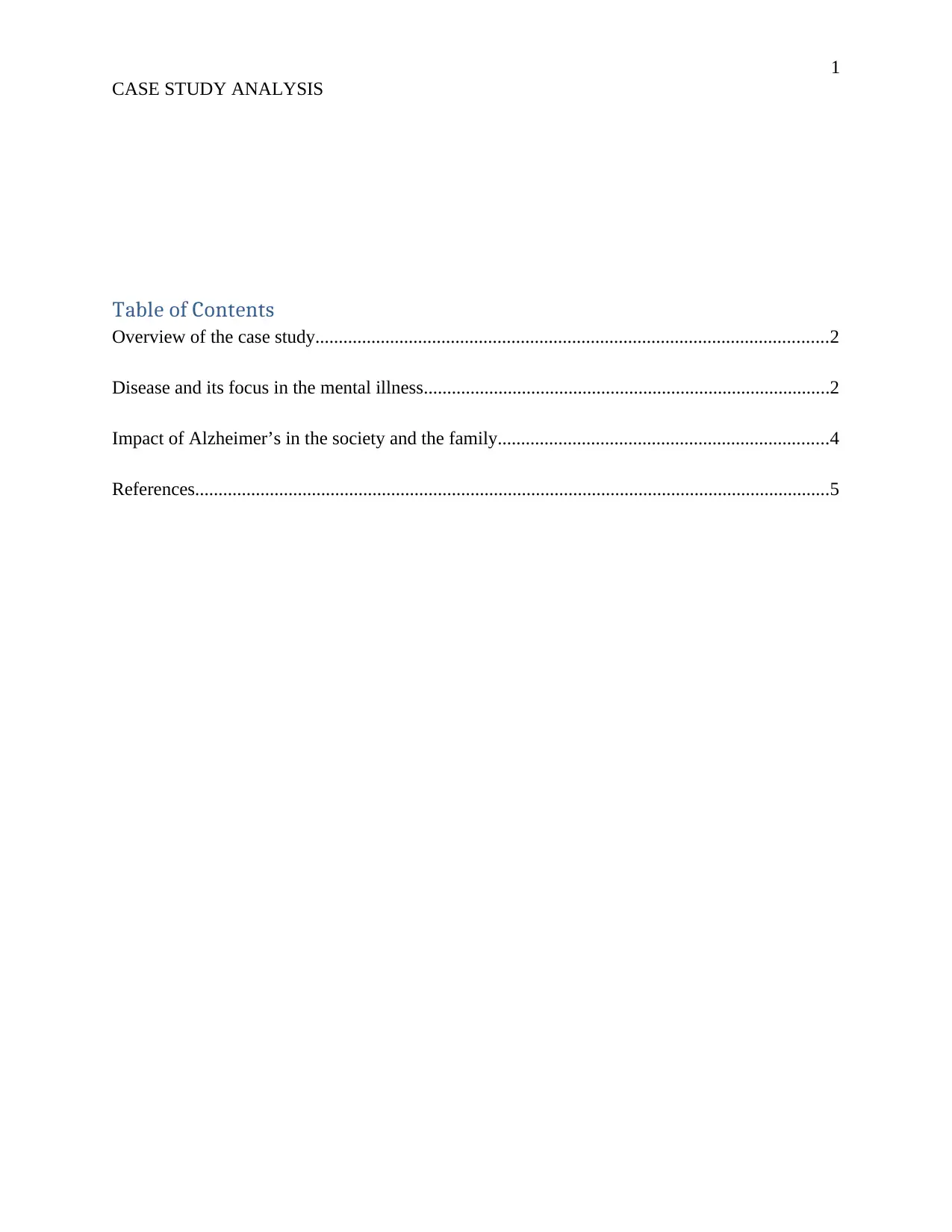
1
CASE STUDY ANALYSIS
Table of Contents
Overview of the case study..............................................................................................................2
Disease and its focus in the mental illness.......................................................................................2
Impact of Alzheimer’s in the society and the family.......................................................................4
References........................................................................................................................................5
CASE STUDY ANALYSIS
Table of Contents
Overview of the case study..............................................................................................................2
Disease and its focus in the mental illness.......................................................................................2
Impact of Alzheimer’s in the society and the family.......................................................................4
References........................................................................................................................................5
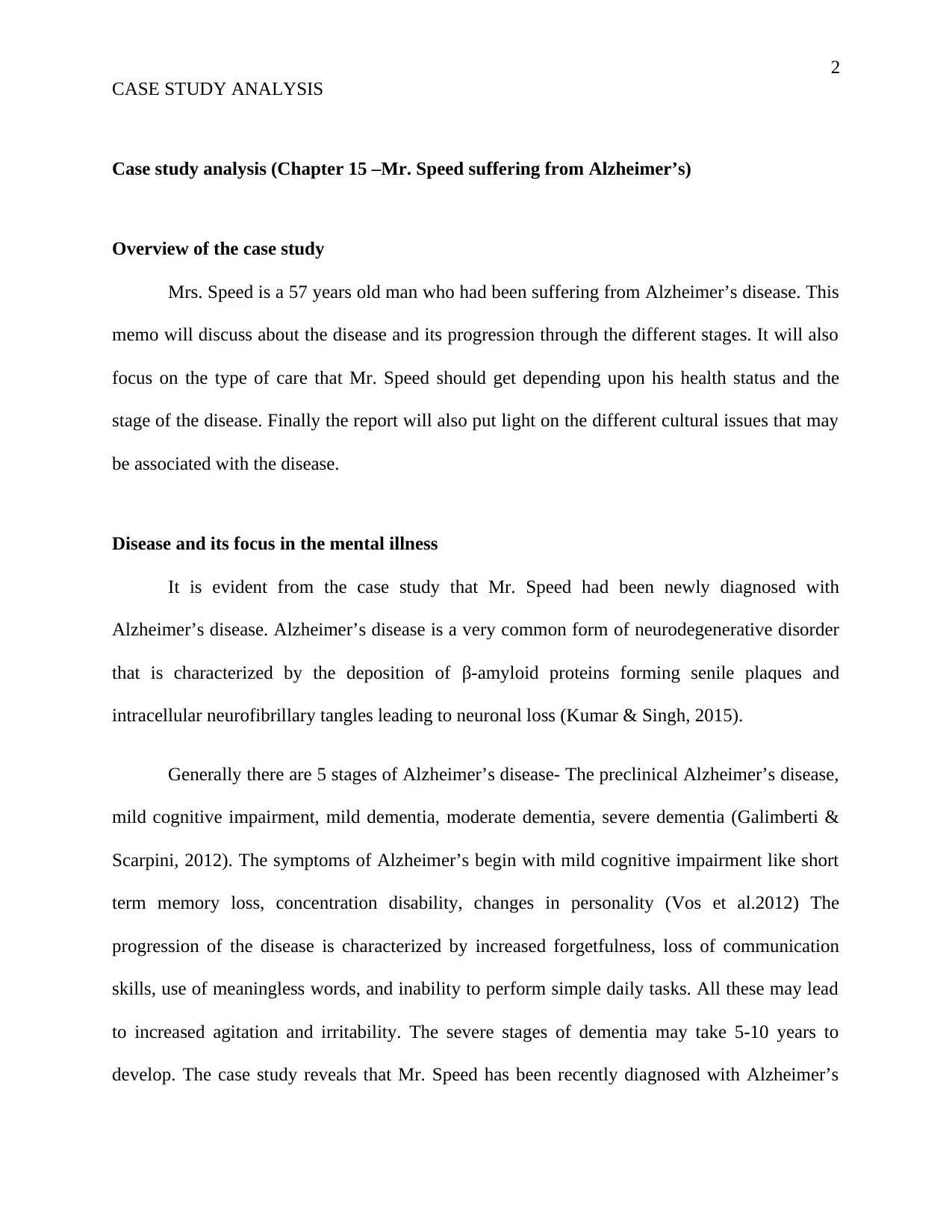
2
CASE STUDY ANALYSIS
Case study analysis (Chapter 15 –Mr. Speed suffering from Alzheimer’s)
Overview of the case study
Mrs. Speed is a 57 years old man who had been suffering from Alzheimer’s disease. This
memo will discuss about the disease and its progression through the different stages. It will also
focus on the type of care that Mr. Speed should get depending upon his health status and the
stage of the disease. Finally the report will also put light on the different cultural issues that may
be associated with the disease.
Disease and its focus in the mental illness
It is evident from the case study that Mr. Speed had been newly diagnosed with
Alzheimer’s disease. Alzheimer’s disease is a very common form of neurodegenerative disorder
that is characterized by the deposition of β-amyloid proteins forming senile plaques and
intracellular neurofibrillary tangles leading to neuronal loss (Kumar & Singh, 2015).
Generally there are 5 stages of Alzheimer’s disease- The preclinical Alzheimer’s disease,
mild cognitive impairment, mild dementia, moderate dementia, severe dementia (Galimberti &
Scarpini, 2012). The symptoms of Alzheimer’s begin with mild cognitive impairment like short
term memory loss, concentration disability, changes in personality (Vos et al.2012) The
progression of the disease is characterized by increased forgetfulness, loss of communication
skills, use of meaningless words, and inability to perform simple daily tasks. All these may lead
to increased agitation and irritability. The severe stages of dementia may take 5-10 years to
develop. The case study reveals that Mr. Speed has been recently diagnosed with Alzheimer’s
CASE STUDY ANALYSIS
Case study analysis (Chapter 15 –Mr. Speed suffering from Alzheimer’s)
Overview of the case study
Mrs. Speed is a 57 years old man who had been suffering from Alzheimer’s disease. This
memo will discuss about the disease and its progression through the different stages. It will also
focus on the type of care that Mr. Speed should get depending upon his health status and the
stage of the disease. Finally the report will also put light on the different cultural issues that may
be associated with the disease.
Disease and its focus in the mental illness
It is evident from the case study that Mr. Speed had been newly diagnosed with
Alzheimer’s disease. Alzheimer’s disease is a very common form of neurodegenerative disorder
that is characterized by the deposition of β-amyloid proteins forming senile plaques and
intracellular neurofibrillary tangles leading to neuronal loss (Kumar & Singh, 2015).
Generally there are 5 stages of Alzheimer’s disease- The preclinical Alzheimer’s disease,
mild cognitive impairment, mild dementia, moderate dementia, severe dementia (Galimberti &
Scarpini, 2012). The symptoms of Alzheimer’s begin with mild cognitive impairment like short
term memory loss, concentration disability, changes in personality (Vos et al.2012) The
progression of the disease is characterized by increased forgetfulness, loss of communication
skills, use of meaningless words, and inability to perform simple daily tasks. All these may lead
to increased agitation and irritability. The severe stages of dementia may take 5-10 years to
develop. The case study reveals that Mr. Speed has been recently diagnosed with Alzheimer’s
⊘ This is a preview!⊘
Do you want full access?
Subscribe today to unlock all pages.

Trusted by 1+ million students worldwide
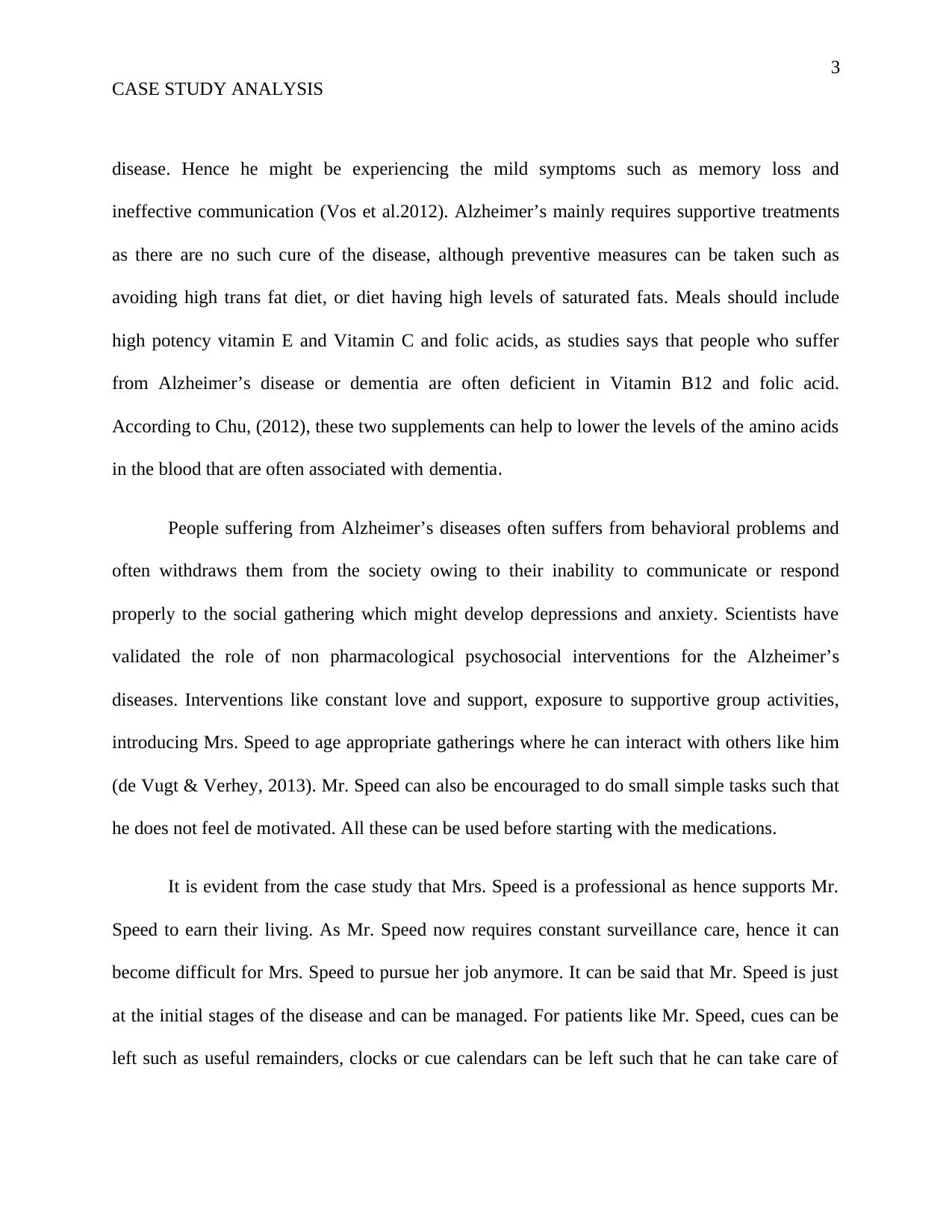
3
CASE STUDY ANALYSIS
disease. Hence he might be experiencing the mild symptoms such as memory loss and
ineffective communication (Vos et al.2012). Alzheimer’s mainly requires supportive treatments
as there are no such cure of the disease, although preventive measures can be taken such as
avoiding high trans fat diet, or diet having high levels of saturated fats. Meals should include
high potency vitamin E and Vitamin C and folic acids, as studies says that people who suffer
from Alzheimer’s disease or dementia are often deficient in Vitamin B12 and folic acid.
According to Chu, (2012), these two supplements can help to lower the levels of the amino acids
in the blood that are often associated with dementia.
People suffering from Alzheimer’s diseases often suffers from behavioral problems and
often withdraws them from the society owing to their inability to communicate or respond
properly to the social gathering which might develop depressions and anxiety. Scientists have
validated the role of non pharmacological psychosocial interventions for the Alzheimer’s
diseases. Interventions like constant love and support, exposure to supportive group activities,
introducing Mrs. Speed to age appropriate gatherings where he can interact with others like him
(de Vugt & Verhey, 2013). Mr. Speed can also be encouraged to do small simple tasks such that
he does not feel de motivated. All these can be used before starting with the medications.
It is evident from the case study that Mrs. Speed is a professional as hence supports Mr.
Speed to earn their living. As Mr. Speed now requires constant surveillance care, hence it can
become difficult for Mrs. Speed to pursue her job anymore. It can be said that Mr. Speed is just
at the initial stages of the disease and can be managed. For patients like Mr. Speed, cues can be
left such as useful remainders, clocks or cue calendars can be left such that he can take care of
CASE STUDY ANALYSIS
disease. Hence he might be experiencing the mild symptoms such as memory loss and
ineffective communication (Vos et al.2012). Alzheimer’s mainly requires supportive treatments
as there are no such cure of the disease, although preventive measures can be taken such as
avoiding high trans fat diet, or diet having high levels of saturated fats. Meals should include
high potency vitamin E and Vitamin C and folic acids, as studies says that people who suffer
from Alzheimer’s disease or dementia are often deficient in Vitamin B12 and folic acid.
According to Chu, (2012), these two supplements can help to lower the levels of the amino acids
in the blood that are often associated with dementia.
People suffering from Alzheimer’s diseases often suffers from behavioral problems and
often withdraws them from the society owing to their inability to communicate or respond
properly to the social gathering which might develop depressions and anxiety. Scientists have
validated the role of non pharmacological psychosocial interventions for the Alzheimer’s
diseases. Interventions like constant love and support, exposure to supportive group activities,
introducing Mrs. Speed to age appropriate gatherings where he can interact with others like him
(de Vugt & Verhey, 2013). Mr. Speed can also be encouraged to do small simple tasks such that
he does not feel de motivated. All these can be used before starting with the medications.
It is evident from the case study that Mrs. Speed is a professional as hence supports Mr.
Speed to earn their living. As Mr. Speed now requires constant surveillance care, hence it can
become difficult for Mrs. Speed to pursue her job anymore. It can be said that Mr. Speed is just
at the initial stages of the disease and can be managed. For patients like Mr. Speed, cues can be
left such as useful remainders, clocks or cue calendars can be left such that he can take care of
Paraphrase This Document
Need a fresh take? Get an instant paraphrase of this document with our AI Paraphraser
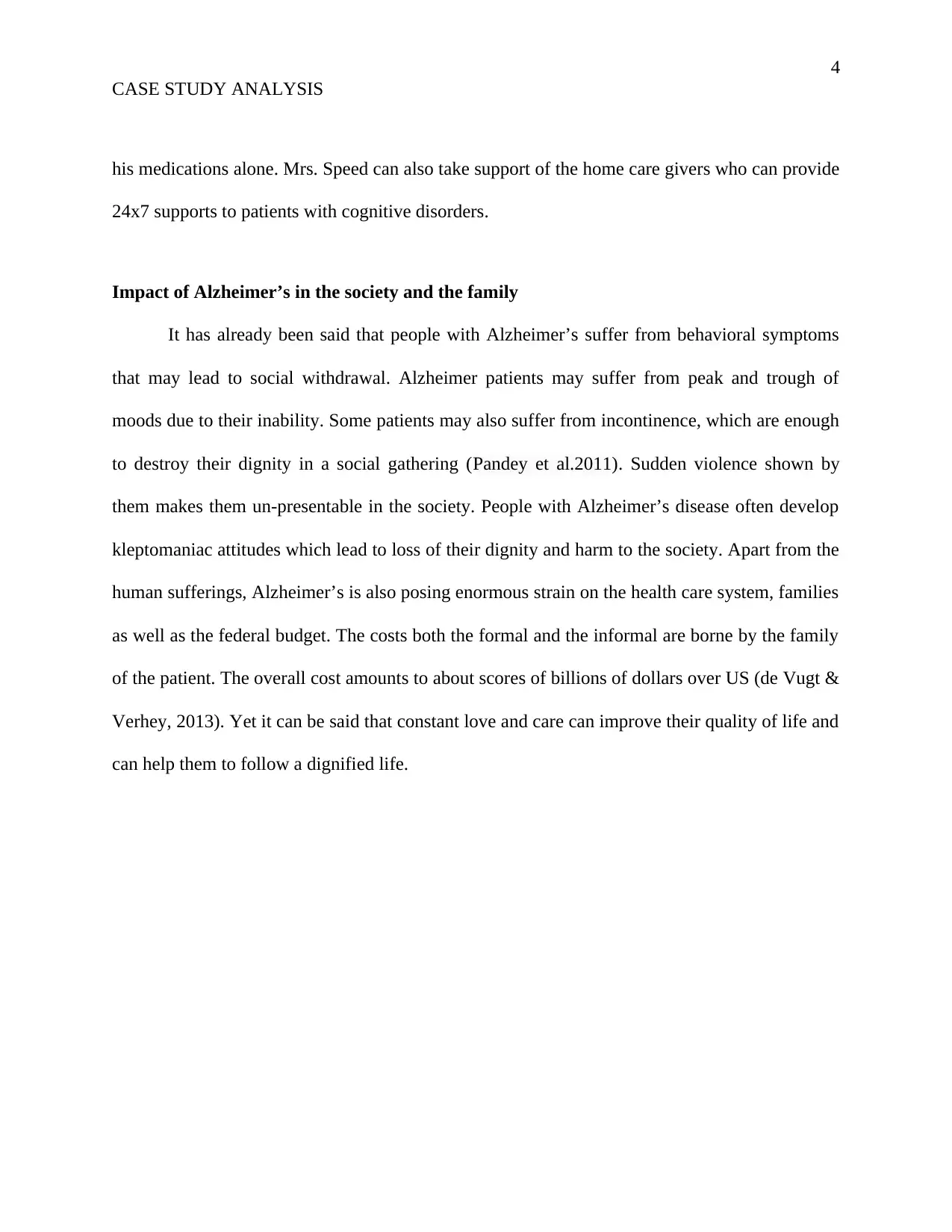
4
CASE STUDY ANALYSIS
his medications alone. Mrs. Speed can also take support of the home care givers who can provide
24x7 supports to patients with cognitive disorders.
Impact of Alzheimer’s in the society and the family
It has already been said that people with Alzheimer’s suffer from behavioral symptoms
that may lead to social withdrawal. Alzheimer patients may suffer from peak and trough of
moods due to their inability. Some patients may also suffer from incontinence, which are enough
to destroy their dignity in a social gathering (Pandey et al.2011). Sudden violence shown by
them makes them un-presentable in the society. People with Alzheimer’s disease often develop
kleptomaniac attitudes which lead to loss of their dignity and harm to the society. Apart from the
human sufferings, Alzheimer’s is also posing enormous strain on the health care system, families
as well as the federal budget. The costs both the formal and the informal are borne by the family
of the patient. The overall cost amounts to about scores of billions of dollars over US (de Vugt &
Verhey, 2013). Yet it can be said that constant love and care can improve their quality of life and
can help them to follow a dignified life.
CASE STUDY ANALYSIS
his medications alone. Mrs. Speed can also take support of the home care givers who can provide
24x7 supports to patients with cognitive disorders.
Impact of Alzheimer’s in the society and the family
It has already been said that people with Alzheimer’s suffer from behavioral symptoms
that may lead to social withdrawal. Alzheimer patients may suffer from peak and trough of
moods due to their inability. Some patients may also suffer from incontinence, which are enough
to destroy their dignity in a social gathering (Pandey et al.2011). Sudden violence shown by
them makes them un-presentable in the society. People with Alzheimer’s disease often develop
kleptomaniac attitudes which lead to loss of their dignity and harm to the society. Apart from the
human sufferings, Alzheimer’s is also posing enormous strain on the health care system, families
as well as the federal budget. The costs both the formal and the informal are borne by the family
of the patient. The overall cost amounts to about scores of billions of dollars over US (de Vugt &
Verhey, 2013). Yet it can be said that constant love and care can improve their quality of life and
can help them to follow a dignified life.
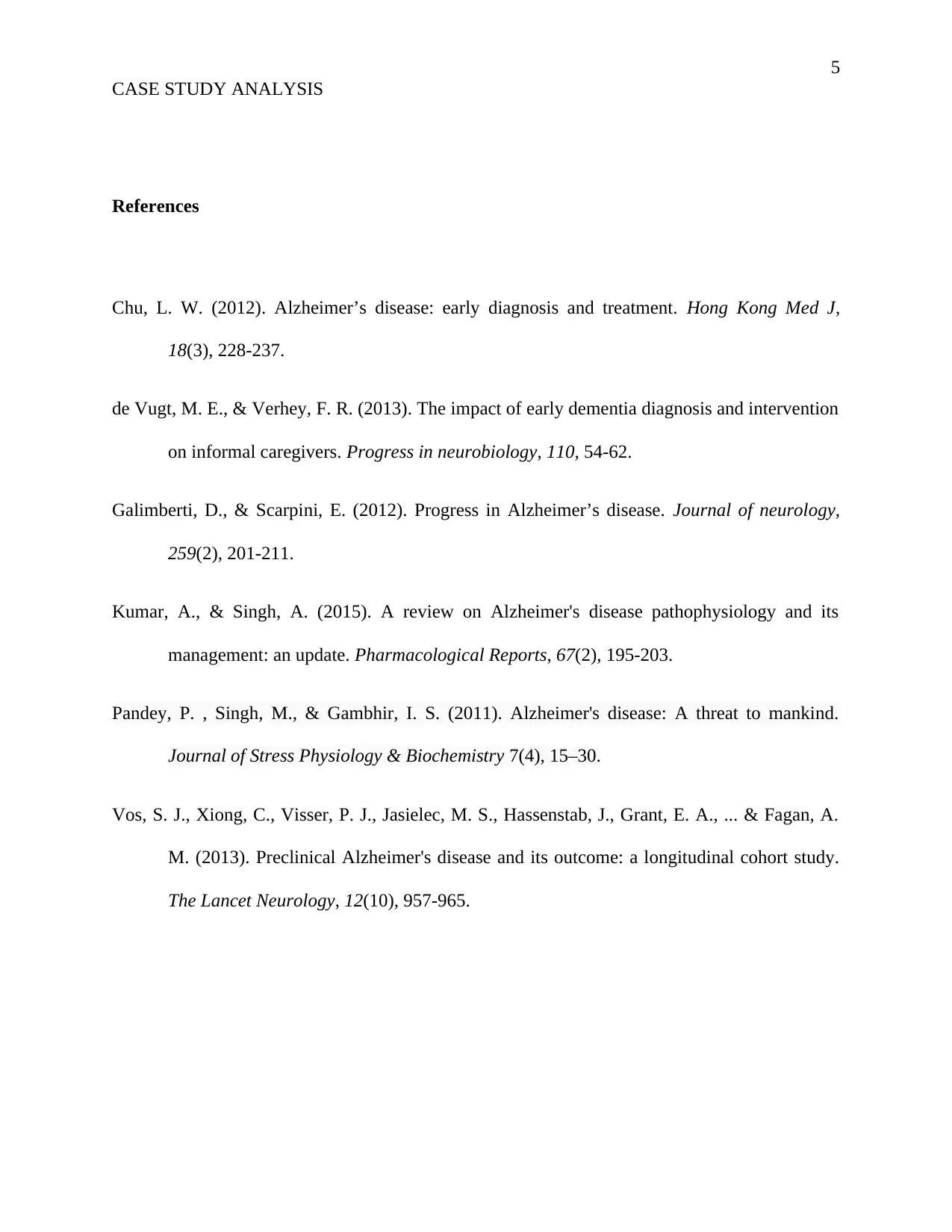
5
CASE STUDY ANALYSIS
References
Chu, L. W. (2012). Alzheimer’s disease: early diagnosis and treatment. Hong Kong Med J,
18(3), 228-237.
de Vugt, M. E., & Verhey, F. R. (2013). The impact of early dementia diagnosis and intervention
on informal caregivers. Progress in neurobiology, 110, 54-62.
Galimberti, D., & Scarpini, E. (2012). Progress in Alzheimer’s disease. Journal of neurology,
259(2), 201-211.
Kumar, A., & Singh, A. (2015). A review on Alzheimer's disease pathophysiology and its
management: an update. Pharmacological Reports, 67(2), 195-203.
Pandey, P. , Singh, M., & Gambhir, I. S. (2011). Alzheimer's disease: A threat to mankind.
Journal of Stress Physiology & Biochemistry 7(4), 15–30.
Vos, S. J., Xiong, C., Visser, P. J., Jasielec, M. S., Hassenstab, J., Grant, E. A., ... & Fagan, A.
M. (2013). Preclinical Alzheimer's disease and its outcome: a longitudinal cohort study.
The Lancet Neurology, 12(10), 957-965.
CASE STUDY ANALYSIS
References
Chu, L. W. (2012). Alzheimer’s disease: early diagnosis and treatment. Hong Kong Med J,
18(3), 228-237.
de Vugt, M. E., & Verhey, F. R. (2013). The impact of early dementia diagnosis and intervention
on informal caregivers. Progress in neurobiology, 110, 54-62.
Galimberti, D., & Scarpini, E. (2012). Progress in Alzheimer’s disease. Journal of neurology,
259(2), 201-211.
Kumar, A., & Singh, A. (2015). A review on Alzheimer's disease pathophysiology and its
management: an update. Pharmacological Reports, 67(2), 195-203.
Pandey, P. , Singh, M., & Gambhir, I. S. (2011). Alzheimer's disease: A threat to mankind.
Journal of Stress Physiology & Biochemistry 7(4), 15–30.
Vos, S. J., Xiong, C., Visser, P. J., Jasielec, M. S., Hassenstab, J., Grant, E. A., ... & Fagan, A.
M. (2013). Preclinical Alzheimer's disease and its outcome: a longitudinal cohort study.
The Lancet Neurology, 12(10), 957-965.
⊘ This is a preview!⊘
Do you want full access?
Subscribe today to unlock all pages.

Trusted by 1+ million students worldwide

6
CASE STUDY ANALYSIS
CASE STUDY ANALYSIS
1 out of 7
Related Documents
Your All-in-One AI-Powered Toolkit for Academic Success.
+13062052269
info@desklib.com
Available 24*7 on WhatsApp / Email
![[object Object]](/_next/static/media/star-bottom.7253800d.svg)
Unlock your academic potential
Copyright © 2020–2026 A2Z Services. All Rights Reserved. Developed and managed by ZUCOL.


![Dementia Care: A Nursing Assignment Report, [University Name]](/_next/image/?url=https%3A%2F%2Fdesklib.com%2Fmedia%2Fdementia-care-symptoms-pathophysiology-mmse-assessment-tool_page_2.jpg&w=256&q=75)


